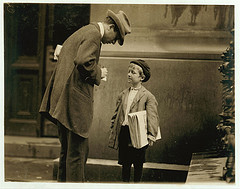How do labor laws affect me when I look for work and get a job?

Here are some old laws that may still be on the books in these states:
- In Florida, you must be 16 before you can wrestle an alligator.If you′re 11 or 12, you may work as a golf caddie for eighteen holes each day in Kentucky.
- In Massachusetts, you must be 18 to get a license to perform as a contortionist.
- In New York, you must be 17 to get hired as a cigar stump collector, rag picker, or bone collector.
- If you want to harvest wild rice in Wisconsin, you have to wait until you′re 16, but there′s no age limit in Washington if you want to pick berries after school.

Photo by Bobster 888 (Flickr)
We′ve come a long way from the days when children worked as many as fifteen hours per day in sweatshop conditions, and today strict federal and state labor laws exist to protect minors from hazardous jobs. Yet accidents and injuries continue to affect young people at work.
In 1938, Congress passed the Fair Labor Standards Act, which spelled out specific do′s and don′ts for employers. The law addresses three areas of child labor: age restrictions, hours of employment, and hazardous jobs. The states have their own child labor laws that, for the most part, shadow the federal law.
If you′re a full-time student, much of the law doesn′t apply to you, because you′re only working after school, on weekends, and during the summer. You don′t need to be concerned about employment contracts, unemployment compensation, health insurance, or other long-term benefits. Once you graduate from high school or college and join the workforce full-time, however, these issues will be important to you.
Unless you′re eighteen, a number of jobs will be off-limits to you. These include logging, railroading, and mining.You also can′t work with power-driven machinery, dynamite, dangerous chemicals, and radioactive materials. Once you′re eighteen, you may work anywhere and for any length of time.

Photo by lemonjenny (Flickr)
States may also have limits on other hazardous and nonhazardous jobs. In some cases, the age restrictions are lowered. For example, you may deliver papers, bag groceries, or wait tables at a younger age. You may work in a family business before you′re eighteen. If your family owns a farm, you may be restricted from operating certain equipment until you′re sixteen or eighteen. Cities and towns have also begun restricting door-to-door sales by minors (to a minimum age and between certain hours).
In addition to age restrictions, prohibited job categories, and limits on working conditions, there are rules about the number of hours you can work.
These include:
• no school hours
• when school is out, no more than forty hours per week, and only eight hours each day
• when school is in session, no more than eighteen hours per week, and only three hours each day
• during the school year, between 7:00 A.M. and 7:00 P.M.; in the summer (June 1 to Labor Day) to 9:00 P.M.
If you′re considering a job that′s a little out of the ordinary or has unusual hours, check the library for your state′s labor laws. They vary among the states and may not follow the federal law described above. In fact, your state may have stricter laws regarding certain jobs. You′ll need a social security number and possibly a work permit or employment certificate before you start your job. Your employer will let you know if a permit is required.
Can you be fired for no reason? In most cases, the answer is yes. Unless you have a contract with your employer, you′re considered an employee-at-will. This means you work at the pleasure of your boss, and your boss can let you go for any reason.
Employers may not discriminate against you on the basis of disability, race, color, gender, or religion. The Civil Rights Act of 1964 and the Americans with Disabilities Act of 1990 (ADA) protect you from unlawful discrimination. Recognizing that there are 43 million Americans with physical and mental disabilities, the U.S. Congress intended the ADA to provide a clear mandate for the elimination of discrimination against individuals with disabilities.
The ADA requires equality of opportunity and treatment for persons with disabilities in private and public employment. It also applies to services offered by state and local governments, and places of public accommodation. The ADA covers employers with at least fifteen employees, so it may not apply to you. The Act doesn′t guarantee your position; it only requires employers to reasonably accommodate your disability regarding work schedule, job assignment, and the purchase of specialized equipment. If accommodation creates an undue hardship on the employer, the Act doesn′t apply.
The law, however, doesn′t require employers to hire you.You still must qualify for any job, and you must be able to do the work once you start. If you believe that you have been discriminated against at work or in applying for a job, do something about it! First, discuss your concerns with the employer.You may want to tell your parents and see if they can assist you in resolving the problem. If these steps are unsuccessful, contact the local office of the Equal Employment Opportunity Commission (EEOC) to review your case and help resolve it.
Don’t give up out of frustration if you don’t find a job right away. The U.S. economy is slowly coming back even though teen unemployment is high. The global unemployment rate for 15 to 24 year olds is 13% according to the United Nations. [source: NY Times Upfront Magazine, Sept. 20, 2010)].
For current information about teens in the work force, take a look at: http://www.youthtoday.org/ and www.youth.eeoc.gov/
Note: In 1999 Toys ‘R’ Us was fined $200,000.00 for child labor violations including kids working long hours and into the night. The case involved 14 and 15-year-olds who stocked shelves, operated cash registers and cleaned the stores.



My son will be 18 this month. WE live in West Virgina. He works for a local park as a bus boy. He is in his senior year. Is there some kind of law on how long they can work 18 year olds when they are still in school. I’m very worried that he gets off work so late that it will start effecting his grades. We need our youth to be successful in life.
Judge Tom’s response:
You’re right, Carol. We need our youth to be educated, responsible and content. Every state has its own child labor laws. Google “West Virginia child labor” and you’ll see the specifics that apply to your son. Now that he’s 18, there may be few laws that restrict his employment, whether he’s in school or not. You might also check the U.S. Department of Labor web site under West Virginia. Good luck.
I have an g.p.s ankle bracelet monitor and it goes off saying I’m not at home and i be there and when I’m in school i got teachers telling me to step out of my class what can i do about that because this g.p.s is not function.Can you help me out with some answer because i don’t want to go back to jail for this bracelet.
Judge Tom’s response:
Erma, you need to talk with your probation or parole officer and explain the problem. It sounds like the monitor is defective or needs an adjustment. There’s an easy fix once you let him or her know what’s going on. Good luck.